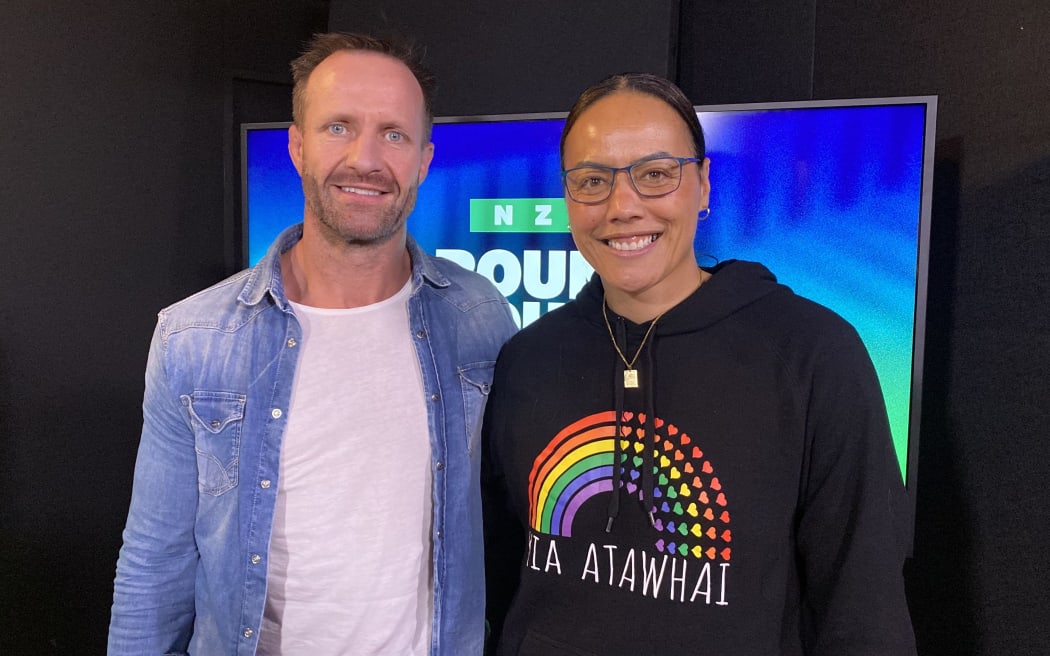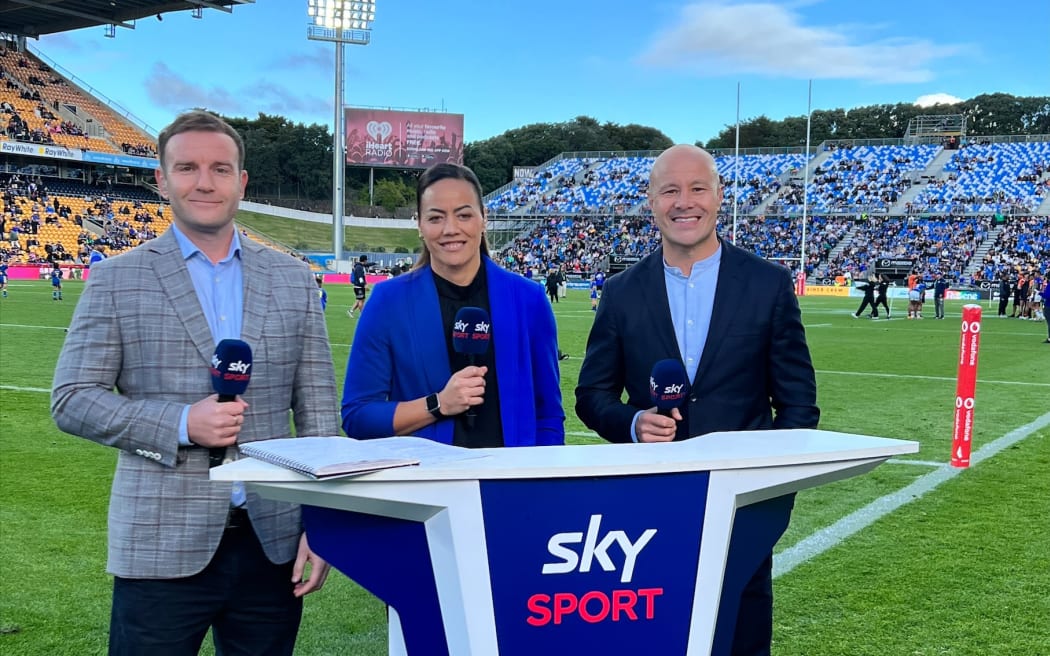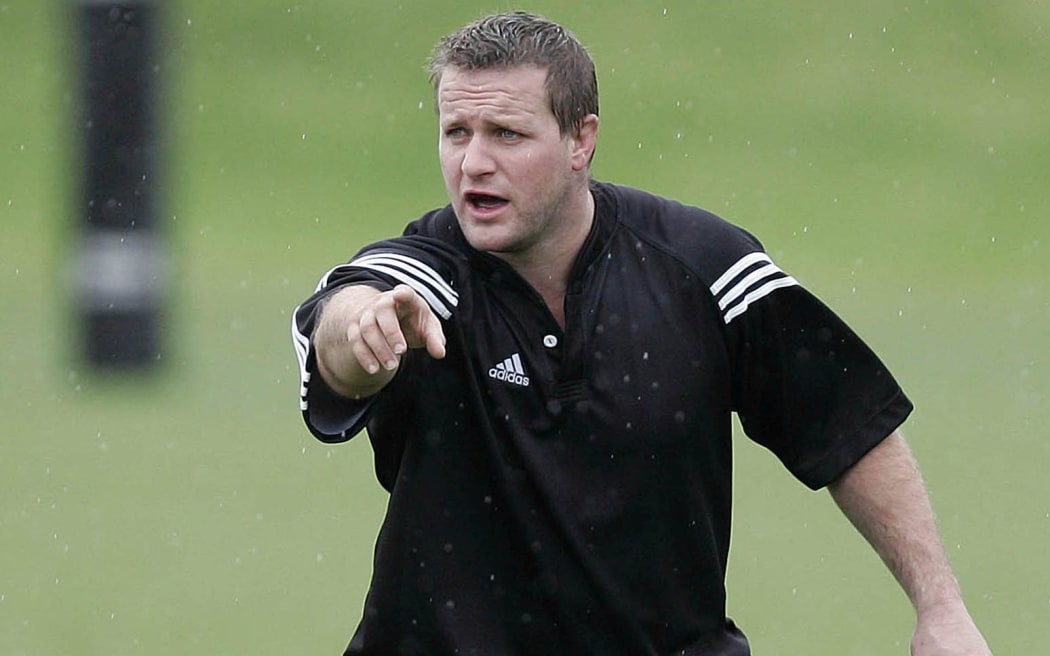Coming out in a black jersey: Campbell Johnstone and Honey Hireme-Smiler

Campbell Johnstone and Honey Hireme-Smiler are doing a podcast on their experiences of being gay and at the same time playing high-level rugby.
Photo: RNZ / Jamie Wall
A few months on from Campbell Johnstone’s announcement on national television that he was the first openly gay All Black, it’s not hard to tell from his demeanour that he’s still not 100 percent sure what the fuss is about.
When asked about what it’s been like he simply chuckles and said: “Pretty good”.
It’s that kind of laconic response that reminds you Johnstone is very much a rugby man, after all. The way he says those two words could be about anything, the way his team has been going, a referee’s decision or the temperature of the showers post-match.
Johnstone has been in an Auckland recording studio, sitting next to Honey Hireme-Smiler, marvelling not just at the Kiwi Fern/ Black Fern winger’s career achievements but also her status as a dual code commentator with Sky TV.

Honey Hireme-Smiler has been on the commentary team for Sky’s coverage of the Warriors in the NRL.
Photo: Honey Hireme-Smiler
The two have been brought together by NZ Rugby to record a podcast about their experiences of both being elite level rugby players and gay – something that for both has been a different journey.
“It’s been humbling,” said the 43-year-old Johnstone, creeping out of the stoic media mode that would have been wired in by the All Black media machine when he played three tests in 2005.
“The stories that people have shared with me privately has been rewarding. A lot of people I don’t even know have reached out, then there’s been the people I haven’t talked to in years that I went to school with. Everyone’s been really accepting and cool about it.”
Hireme-Smiler WAs in no doubt how big Johnstone’s announcement was.
“It was about bloody time,” she said.
“I’m really proud. Not just to finally have an All Black come out but more I think it’s been really cool to see the positivity and feedback. It really shows where society sits in terms of the rainbow community and it’s just going to open a lot more doors and acceptance for young males and females in our sporting community.”
Given the ubiquitous relationship between women’s rugby and the rainbow community, it would be easy to think that Hireme-Smiler’s experience would have been far more straightforward, but that’s not telling the whole story.
“Yes and no,” she said when asked about whether coming out was an easy thing to do.
“Growing up I knew at a young age about my own sexuality but I was really reserved and I feared being judged, so I kept it quiet. I grew up in a small town, so that sort of judgement worried me as well.
“But once I stepped into women’s rugby when I was 16-17 and saw that it was accepted and talked about, it helped me step up and be honest with myself. As female athletes we do it a bit differently, and we have that nurturing environment.”
See The Detail’s report on Campbell Johnstone’s revelation he is gay
Post-match ‘anxiety’
It is also not black and white when it comes to Johnstone’s feelings of being in the hyper-masculine world of elite men’s rugby. The prop forward often found rugby a safe haven for dealing with what else was going on in his life, a feeling that will be familiar for many players in all sorts of situations. So did it really matter to him at the time?
“It’s a good question. When you’re playing, the focus of the team is on goals and winning, nothing really comes into your thinking till after, when you’re away from that. My sexuality would come to my thinking later, in a uniquely ironic sense I found so much peace and joy in rugby because all I could focus on was rugby.
“When I’d get home all this anxiety would come in, the whole idea of not being honest – because that’s the big thing about being in a team, we’re all up front about how you play and things like that. So, I always had that eating away at me. It builds up.”

Campbell Johnstone in his All Black days.
Photo: Photosport/ Hagen Hopkins
Hireme-Smiler acknowledges that while Johnstone’s coming out necessitated a bit of fanfare, the main opinions that mattered to her were her parents.
“I really didn’t care what anyone else thought after that. They were fine with it, going back to my teams that I played on it was just about rugby or league. I’m the winger, I’m out here to score tries so we can win the game.”
It is worth noting that Johnstone finished his New Zealand career back in the late 2000s and plenty has naturally shifted within male rugby culture since then, regardless of his announcement.
“After I was on TV I went and visited the Crusaders,” he said.
“It was the first time I’d come back to a New Zealand team since I’d been overseas. Just the language and the way they were talking to each other had completely changed since when I was playing. You could really sense a real respect, care and awareness in their language.
“They were very conscious of what their words could mean. Obviously back when I played we had the good banter but it’s moving in the right direction.
“But they’re keeping the stuff we love about rugby, the combat, the skill.”
Hireme-Smiler points to her work with The Waterboy charity, which saw her visit schools in the Waikato region promoting involvement in sport for youth.
“It is funny, the young people are far more educated and upskilled in this area. It’s their norm. You can definitely feel like things have changed… they are like ‘Oh we don’t actually say that sort of stuff anyway’.”
Johnstone said it was “great” when current All Blacks Brad Weber, TJ Perenara and Ardie Savea lent their voices to advocacy around sexuality.
“It just shows that it’s in their thinking, in that umbrella of respect for all different communities. I think it’s awesome for our sport.”
It was a view shared by NZ Rugby, which is clearly keen to champion the diversity that both Johnstone and Hireme-Smiler represent. It also represents an era in rugby that has been a long time coming, given the sport’s historically conservative nature as a red-blooded male pursuit soaked in booze once the final whistle has blown.
In a relatively short space of time, though, the elite level has become a co-working space for the now very popular Black Ferns, a group that has always had openly gay players since its inception more than 30 years ago.
For Hireme-Smiler though, given that the women’s game was formed partly as an anti-patriarchal movement, the importance of not losing the unique element of togetherness is key as it becomes more mainstream and professional.
“Without those trailblazers and their legacy, we have nothing to leverage off. They are the reason why the game has got to where it is. I think it’s really important to take ownership of that space, that we play the game the way we want to play and opening up that environment. We want anyone and everyone to come along and be a part of women’s rugby.”
That’s something that Johnstone hopes men’s rugby, despite its inherent difference in scale, competition and culture, can learn from.
“The nurturing and caring side, for sure. Guys are notorious for bottling things up and not showing emotions, I think the women’s game shows you can be tough as nails on the field but off it shows that you can give a bit of care and empathy to your team-mate, understanding what situation they are going through,” he said.
“NZ Rugby’s been incredibly supportive. They’ve always held my privacy and my situation in the highest regard and respected it. They’re making real headway in this space.”
It’s the actions speaking louder than words that make the commitment from NZ Rugby feel real to Hireme-Smiler.
“They’ve put a stake in the ground and said this is where we stand,” she said.
The good news, according to both former players’ experiences engaging with young people, is that the message feels like it’s almost coming from the other direction.
“We can learn a whole lot from our youth coming through… they are a lot more open and inclusive,” Hireme-Smiler said.
It’s clear after a decent amount of time talking to Johnstone, who is now firmly in the books as the first openly gay All Black, that what started out as a bit of a sheepish conversation, has tapped into something immeasurably more personal.
“In sport we have this value of respect,” he says with a bit of a harder edge to his tone. “We need to start thinking the rainbow community comes under that banner of respect.”
For all the latest Sports News Click Here
For the latest news and updates, follow us on Google News.
